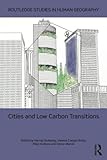Cities and low carbon transitions
Material type: TextSeries: Routledge Studies in Human GeographyPublication details: Routledge London 2013Description: xv, 205 pISBN:
TextSeries: Routledge Studies in Human GeographyPublication details: Routledge London 2013Description: xv, 205 pISBN: - 9780415814751
- 307.1216 BUL
| Item type | Current library | Collection | Call number | Status | Date due | Barcode | |
|---|---|---|---|---|---|---|---|
 Book
Book
|
Indian Institute of Management LRC General Stacks | Public Policy & General Management | 307.1216 BUL (Browse shelf(Opens below)) | Available | 007627 |
Current societies face unprecedented risks and challenges connected to climate change. Addressing them will require fundamental transformations in the infrastructures that sustain everyday life, such as energy, water, waste and mobility. A transition to a ‘low carbon’ future implies a large scale reorganisation in the way societies produce and use energy. Cities are critical in this transition because they concentrate social and economic activities that produce climate change related emissions. At the same time, cities are increasingly recognised as sources of opportunities for climate change mitigation. Whether, how and why low carbon transitions in urban systems take place in response to climate change will therefore be decisive for the success of global mitigation efforts. As a result, climate change increasingly features as a critical issue in the management of urban infrastructure and in urbanisation policies.
Cities and Low Carbon Transitions presents a ground-breaking analysis of the role of cities in low carbon socio-technical transitions. Insights from the fields of urban studies and technological transitions are combined to examine how, why and with what implications cities bring about low carbon transitions. The book outlines the key concepts underpinning theories of socio-technical transition and assesses its potential strengths and limits for understanding the social and technological responses to climate change that are emerging in cities. It draws on a diverse range of examples including world cities, ordinary cities and transition towns, from North America, Europe, South Africa and China, to provide evidence that expectations, aspirations and plans to undertake purposive socio-technical transitions are emerging in different urban contexts.
This collection adds to existing literature on cities and energy transitions and introduces critical questions about power and social interests, lock-in and development trajectories, social equity and economic development, and socio-technical change in cities. The book addresses academics, policy makers, practitioners and researchers interested in the development of systemic responses in cities to curb climate change.
(https://www.routledge.com/Cities-and-Low-Carbon-Transitions/Bulkeley-CastanBroto-Hodson-Marvin/p/book/9780415814751?srsltid=AfmBOorAIDXhEFvcEDiPkwNZA_eEbabaDhPXz4wZLWON2hEseHD2FcFH)
There are no comments on this title.
